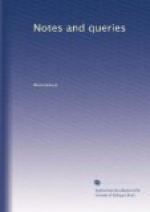“No one has yet conceived, nor has it entered the mind of man, what patience, perseverance, and general knowledge are necessary for an editor of a Collection of Ancient Ballads; nor what mountains of difficulties he has to overcome; what hosts of enemies he has to encounter; and what myriads of little-minded quibblers he has to silence. The writing of explanatory notes is like no other species of literature. History throws {52} little light upon their origin [the ballads, I suppose?], or the cause which gave rise to their composition. He has to grope his way in the dark: like Bunyan’s pilgrim, on crossing the Valley of the Shadow of Death, he hears sounds and noises, but cannot, to a certainty, tell from whence they come, nor to what place they proceed. The one time, he has to treat of fabulous ballads in the most romantic shape; the next, legendary, with all its exploded, obsolete, and forgotten superstitions; also history, tragedy, comedy, love, war, and so on; all, perhaps, within the narrow compass of a few hours,—so varied must his genius and talents be.”
After this we ought surely to rejoice, that any one hardy enough to become an Editor of Old Ballads is left amongst us.
EDWARD F. RIMBAULT.
* * * * *
THE FATHER OF PHILIP MASSINGER.
Gifford was quite right in stating that the name of the father of Massinger, the dramatist, was Arthur, according to Oldys, and not Philip, according to Wood and Davies. Arthur Massinger (as he himself spelt the name, although others have spelt it Messenger, from its supposed etymology) was in the service of the Earl of Pembroke, who married the sister of Sir Philip Sidney, in whose family the poet Daniel was at one time tutor. I have before me several letters from him to persons of note and consequence, all signed “Arthur Massinger;” and to show his importance in the family to which he was attached, I need only mention, that in 1597, when a match was proposed between the son of Lord Pembroke and the daughter of Lord Burghley, Massinger, the poet’s father, was the confidential agent employed between the parties. My purpose at present is to advert to a matter which occurred ten years earlier, and to which the note I am about to transcribe relates. It appears that in March, 1587, Arthur Massinger was a suitor for the reversion of the office of Examiner in the Court of the Marches toward South Wales, for which also a person of the name of Fox was a candidate; and, in order to forward the wishes of his dependent, the Earl of Pembroke wrote to Lord Burghley as follows:—




